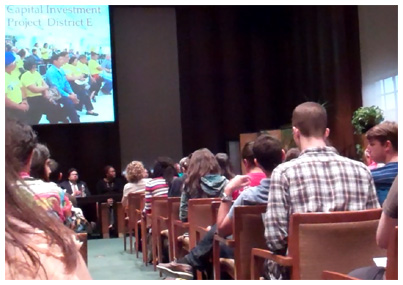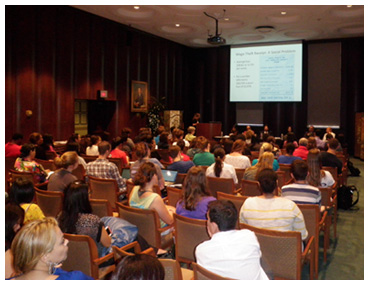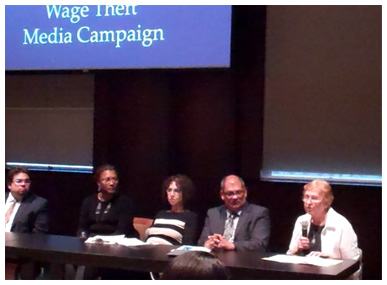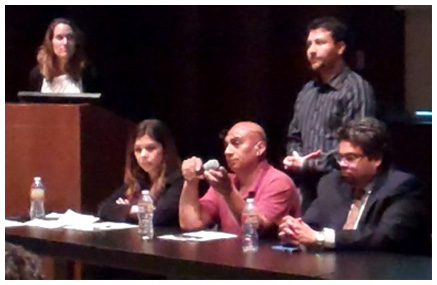 Last month a panel of civic leaders, employers, attorneys and workers participated in a forum discussion titled “Wage Theft – Its Impact on the Local Economy and in the Community”. The free event, hosted by Rice University’s Center for the Study of Women, Gender and Sexuality and by the Fey y Justica Worker’s Center (formerly the Houston Interfaith Worker Justice Center), was held on the 3rd floor of the Fondren Library at Rice University. The diverse panel offered different perspectives on how wage theft impacts the local Houston economy, responsible businesses, social programs, and the community as well as what can be done to eliminate this unethical practice.
Last month a panel of civic leaders, employers, attorneys and workers participated in a forum discussion titled “Wage Theft – Its Impact on the Local Economy and in the Community”. The free event, hosted by Rice University’s Center for the Study of Women, Gender and Sexuality and by the Fey y Justica Worker’s Center (formerly the Houston Interfaith Worker Justice Center), was held on the 3rd floor of the Fondren Library at Rice University. The diverse panel offered different perspectives on how wage theft impacts the local Houston economy, responsible businesses, social programs, and the community as well as what can be done to eliminate this unethical practice.
Simply put, wage theft is a practice in which employers cheat workers out of wages and benefits owed. According to Houston’s Down With Wage Theft Campaign:
“Wage theft depresses family income and as a consequence limits spending, lowers business sales, leaves taxes unpaid, public services undermined and economic growth diminished.  According to DOL Wage & Hour statistics, Houston employers have had to pay almost $20 million in back wages since FY 2008.
According to DOL Wage & Hour statistics, Houston employers have had to pay almost $20 million in back wages since FY 2008.
“A recent report of the National Employment Law Project estimates that 76% of workers owed overtime were under paid or unpaid, 68% of low-wage workers experience wage violations each week, and 26% experience minimum wage violations. Wage theft affects all industries, especially low-wage work.”
The evening began with a welcome from Dr. Rosemary Hennessy, Director of the Center for the Study of Women Gender and Sexuality followed by a few words from two professors from the Rice Sociology Department, Dr. Sergio Chavez and Dr. Robin Paige. The featured panelists for the evening included employers, attorneys, clergy, and workers. Attendees included representatives from responsible business, community organizations, workers, press, and Rice University students who were enrolled in classes such as Poverty, Gender and Human Development. The following is some of what the panelists had to say.
Pastor Daniel Melendez, speaking in Spanish with an English translator, said: “The Bible says that when you steal the wages from a laborer, or if the worker does not get paid a fair salary, not only are we committing an injustice, the injustice correlates to sin. There is a passage in James: ‘You have not paid the salary to the workers, and the Almighty has heard. That money that you have not paid, will accuse you in the future before God.’ "[James 5:4] Sister Ceil Roeger said that wage theft was stealing from the poor because it disproportionally impacts those already living in poverty. She said, “All work – whether it is done by the CEO of a construction company, or the men digging the ditches or climbing the scaffolding, or working in carpentry – is dignified work. Just as every person deserves to be treated with dignity and respect, so does the work he or she does. Wage theft infringes on the worker’s human dignity and demeans the value of his or her work. Every worker has a right to be paid. The fact that workers are cheated out of their wages is outrageous. And to cheat someone out of his or her wages is not only to steal from that person but it is also stealing from their families. As mentioned, most of these workers are already living in poverty, and to not pay them takes away the family’s ability to provide for their basic needs. As a person of faith, I find this practice to be not only unjust and wrong, but as
Sister Ceil Roeger said that wage theft was stealing from the poor because it disproportionally impacts those already living in poverty. She said, “All work – whether it is done by the CEO of a construction company, or the men digging the ditches or climbing the scaffolding, or working in carpentry – is dignified work. Just as every person deserves to be treated with dignity and respect, so does the work he or she does. Wage theft infringes on the worker’s human dignity and demeans the value of his or her work. Every worker has a right to be paid. The fact that workers are cheated out of their wages is outrageous. And to cheat someone out of his or her wages is not only to steal from that person but it is also stealing from their families. As mentioned, most of these workers are already living in poverty, and to not pay them takes away the family’s ability to provide for their basic needs. As a person of faith, I find this practice to be not only unjust and wrong, but as  Pastor Melendez said, it is a sin – it is highly immoral and it is a sin. Therefore it should not be accepted, especially in a country that calls itself Christian. Other people of other faiths also profess that the rights of workers are something to be respected and paid.”
Pastor Melendez said, it is a sin – it is highly immoral and it is a sin. Therefore it should not be accepted, especially in a country that calls itself Christian. Other people of other faiths also profess that the rights of workers are something to be respected and paid.”
Alfonso Kennard, a board certified attorney in Labor and Employment Law mentioned that even though he approves of the efforts of those working to increase penalties for wage theft, there are already statutes in place. If it can be shown that a worker was not paid properly – that he or she was not paid at least minimum wage and the overtime that was worked – the statutes are very clear, and the worker can be helped. But, unfortunately sometimes the worker may suffer consequences while waiting for the outcome of the legal process. He may be fired for speaking up, and then be without any wages until the case is settled. Kennard stated: “The problem is [not simply] being able to go in and utilize the statutes that we have in place. The real issue is getting people to come forward. ...We just need folks to step up, because once we can get them into the process, we can do some good. But it is really scary for some folks.” Martin Mares was born in Mexico where he received an Assistant Accountant degree before he immigrated to Houston and began working in construction 25 years ago. He also spoke in Spanish with a translator. He said, “There is a saying out there in the street ‘If you ask, you no longer work.’” He said that if you ask questions such as the company name of the employer, just to obtain information in case there is a problem with wage payment in the future, you will not be hired. He said if you have the courage to work a week or a few days and then to tell the employer that you plan to hang on to the employer’s tools until you get paid, the employer just calls the police and accuses you of stealing. Then your vehicle is taken away, you go to jail where you must pay bail to get out, and you pay for a lawyer. The employer has stolen all of this from you and often will say that you are a good person, but ends up just paying a small concession to settle the case. “The truth is, we just came here to work; we were going after a dream. I believe that as human beings – here and anywhere else in the world – we have the same rights.”
Martin Mares was born in Mexico where he received an Assistant Accountant degree before he immigrated to Houston and began working in construction 25 years ago. He also spoke in Spanish with a translator. He said, “There is a saying out there in the street ‘If you ask, you no longer work.’” He said that if you ask questions such as the company name of the employer, just to obtain information in case there is a problem with wage payment in the future, you will not be hired. He said if you have the courage to work a week or a few days and then to tell the employer that you plan to hang on to the employer’s tools until you get paid, the employer just calls the police and accuses you of stealing. Then your vehicle is taken away, you go to jail where you must pay bail to get out, and you pay for a lawyer. The employer has stolen all of this from you and often will say that you are a good person, but ends up just paying a small concession to settle the case. “The truth is, we just came here to work; we were going after a dream. I believe that as human beings – here and anywhere else in the world – we have the same rights.”
Colleen Fugate, a junior at Rice who has volunteered at Fe y Justica Worker Center concluded the evening by asking attendees to sign a petition urging the Mayor of Houston to pass an ordinance to additionally penalize wage theft. Attendees were also asked to call their city council members and to ask for support of this ordinance.
The Down with Wage Theft Campaign is driven by a coalition of Houston community, faith, & labor organizations, responsible businesses, and individuals who believe in standing up for workers’ rights to a fair day’s pay for a fair day’s work and making Houston a just and prosperous place to work. The campaign is spear-headed by the Fe y Justicia Workers’ Center and supported by the coalition. To learn more about the campaign and what you can do to bring down wage theft in Houston, visit the Down with Wage Theft Campaign website.
Wage Theft Forum at Rice University
by Elizabeth McPherson | May 13, 2013



Add new comment